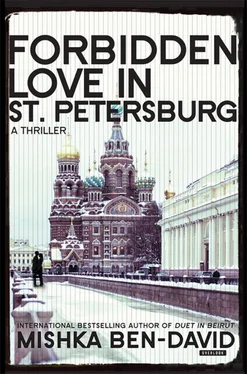They also, of course, wanted to understand who Anna was and what she knew about me and my work. As far as the investigators were concerned there could be no doubt: Anna was a spy catcher and I was her assignment. The only thing they didn’t apparently understand was how it could be that in the course of six months she hadn’t had me arrested. Had I crossed over to her side?
Naturally, the picture I saw was different fromthe one seen by my inquisitors. I didn’t know then about the convoluted steps taken to incriminate Anna in an attempt to persuade me that she was working for the FSB. After everything I’d been shown I couldn’t completely dismiss the possibility that she did indeed work for them. But although that is what reason dictated, deep in my heart I continued not to believe it. And even if that’s what Anna was, I thought, even if, at the beginning, she was assigned to operate against me, I was sure that she began to love me, accepted me for who I said I was when I introduced myself to her, and perhaps even protected me from the authorities.
The fact that I stuck to my cover story would have convinced even a seasoned spy catcher that I was bona fide. Even if she had some suspicions they were at some point allayed and Anna remained with me because a beautiful love story had developed between us. In this situation, even if they forced her to continue spying on me, and even if she persisted in reporting on me and meeting her controller, couldn’t we have gone on living together?
When, in response to the investigators, I offered a detailed reconstruction of the sequence of events in our relationship, I again saw how natural its development had really been. In my heart, the feeling of immense loss became ever deeper. Within me the equivalent of a washing machine was spinning, tossing, wringing everything out but cleaning nothing.
I was constantly tormented by questions of what was now going through her mind. Whether she was an innocent bookseller or a spy catcher who loved me, cleared me, and lived with me out of love and with love–what could she possibly be making of my sudden disappearance? She had no grounds for believing that I’d run away from her or from the authorities in her country.
I could clearly visualize her waiting for me in the evening, and at night, searching, calling hospitals, wandering around places where we’d spent time together; at Vashkirova’s, my previous addresses, even alerting the police. The images of my Annushka helpless, scared, looking for me, and then sitting, demoralized, in our apartment, uncomprehending, waiting for me in vain, broke my heart.
Udi came to visit me. His handshake was firm; mine was limp. I still saw him as responsible for my painful separation from Anna and for the fact that she hadn’t followed me. His attempt to explain why she’d not been given a plane ticket didn’t satisfy me. I filed it as yet another lie hurled at me by the Establishment. Levanon also came and saw fit to embrace me, apparently clinging to the memory of the dozens of operations we’d been in together, ignoring his own last undertaking in which we were on opposite sides of the barricade. For them I was like a son who’d been brought back home from a drug-polluted environment in Goa, whereas for me they were the people who’d driven me out of the private Garden of Eden I’d created for myself.
Before the Shin Bet had finished with me I passed three separate polygraph tests, carried out by three different examiners, with slightly varying questions in each of them. How was I supposed to respond to ‘Were you in contact with a foreign agent?’ I wondered. Even if Anna was indeed a foreign agent, that is not who or what she was as far as I was concerned. I certainly had no contact with her knowing that she was any such thing. How was I supposed to reply to the question ‘Did you pass on information about your work to an unauthorized person?’ When I told Anna that I was going to Makhachkala or to Dushanbe, was I passing on information to an unauthorized person? Even if I’m a businessman and she’s my girlfriend? No wonder they needed to conduct more and more tests. The evidence that I was telling the truth was clearly not definitive.
At the end of that week, the Mossad moved me to a small apartment and I was asked not to leave it until my fate had been decided. Now Eli and Ariel, Alex and Levanon, sat with me, wanting to know details about my work, the deals I’d concluded, and the contacts I’d made. Perhaps, on top of everything else, I was also suspected of being an agent of the Dagestani Mafia, an emissary of Mahashashli’s–who knows? At least that is how it seemed from the way Eli and Ariel spoke to me. Alex and Levanon, on the other hand, tried to project an air of calm, of being happy that I was back home. Even though I didn’t yet know of their role in the great deception, I did have the feeling that we weren’t on the same side so I wasn’t willing to accept their expressions of sympathy.
Behind the scenes various meetings apparently took place to sum things up. About ten days after my return to Israel, Udi informed me that from the point of view of the organization I was clean. However, rather than letting go of me, they wanted me to contribute something from my extensive experience to the younger generation of operatives. He took the trouble to hint that this was not a suggestion I could turn down: as a condition for letting me remain unsupervised, the Shin Bet was insisting that the Mossad take full responsibility for me. And ‘of course’ I was not to communicate with anyone I’d had contact with while in Russia.
Even though it was already evening, I quickly left the Mossad apartment and set myself up temporarily in a hotel in Tel Aviv. It was winter but the air was pleasant. Along the promenade the sea was stormy and I stood peering into the depths, my heart and soul reaching out to the one I’d left behind somewhere there across the ocean. Droplets of salty water from the waves rinsed my face, blending with my tears.
After that, I wandered like a drunk through the city streets, battles raging in my mind between actions and prohibitions, possibilities and fears. Before stumbling back to my hotel I succumbed to temptation and committed my first offence: I called Anna from a public phone box. I prepared the precise words I’d say to her. But there was no answer either at the apartment or at the shop. Thoughts about where Anna could possibly be prevented me from falling asleep. In the middle of the night, in the pouring rain, I went to the nearest public phone, getting soaked to the bone in the process. And again there was no answer. In the early dawn, trembling with cold, I tried for the third time. Once more without success. When I got back to my room the phone rang. It was the night orderly summoning me to an urgent meeting in Ariel’s office. My assumption that only the phone in my room would be tapped into had obviously been somewhat naïve.
If you want a war that’s what you’ll get, Ariel said. And believe me we know how to be bad. Anna is passé. Get that into your head. No phone calls, no letters, no nothing. And be thankful that this is the only restriction you’re under.
I left his office and Mossad HQ and drove to Beersheba to visit my mother.
I had no expectations and yet my heart bled for her. The small woman, who’d managed to preserve a tiny trace of her beauty, not only failed to recognize me but was absolutely detached from everything around her. She didn’t respond, didn’t say a word, not to me, not to anyone else.
I felt like someone coming face to face with his own memoir, and finding it to be a sealed book; gazing at the album of his life and discovering it to be empty. This beloved woman was all that was left to me, and she too was no longer a real presence. I was left without Orit, who’d erased my youth and young adulthood; without Anna, who’d disappeared, taking with her the present and the future I so desired. And also, in effect, without the Mossad, which had shunned me. My mother was the only link I had with who I’d once been, and with who I now was. And the mother I’d had was also not really here. The shrivelled-up shell that so saddened me didn’t embody her. All that was left of what was once my mother was locked in my memories and my feelings.
Читать дальше












